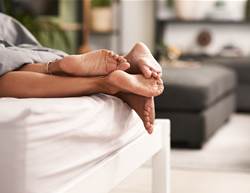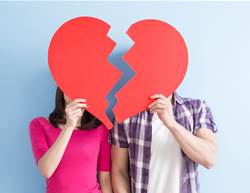What’s going on? Feel like your sex drive is missing in action? Trust us, you’re not alone! In fact, it’s so common, up to 52% of women experience a lack of desire post-menopause. “Often we have so many responsibilities, by the time we hit bed, we’re thinking of nothing but sleep,” explains Gemma Cribb, clinical psychologist at Equilibrium Psychology, Sydney. “And if you’ve been with your partner long-term, it may take even more effort to connect.” Yes, the causes can be complex— both physical and emotional— but that just means there are multiple ways to feel more hot and less bothered. Here’s how!
Lifestyle remedies..
Talk up your connection
Fact: stress, relationship issues and depression can quash your sex drive, but building intimacy outside the bedroom is one of the best ways to fan those flames between the sheets. Talking specifically about sex—what you like, what you don’t—helps too. The reason? It can help push past old habits. “Wait for a private space, where there are few distractions and you’re not rushed,” says Cribb. “If speaking about sex is uncomfortable, write a letter or email, bringing up an article you read and using that as a way to start a conversation.”
Work on your fitness (really!)
Active women tend to have more energy, better body image and less stress, all of which can boost interest in sex. One recent study even found women who watched an erotic video after exercising were significantly more turned on than those who viewed the film but who hadn’t work out.
Dial down your stress levels
Stress hormones like cortisol can kill desire, arousal and satisfaction. Enter mindfulness which has been shown to reduce stress and boost passion. Key techniques include paying close attention to sensations like breathing, sounds and your body’s sexual responses. Easy and effective.
Look into lubrication
Discomfort down below can put the brakes on amorous ideas, fast. But all is not lost! Choose spur-of-the-moment lubes designed specifically for sex or look out for specialised moisturisers designed to help soothe vaginal dryness.
Next-step solutions..
Investigate sex therapy
A trained expert talks with you (and preferably your partner) about your sex life, covering the beginning of your relationship through to the present. Homework may entail working on communication, focusing on sensations and changing how the two of you interact. “That could include physical activities, like pelvic floor exercises, or relational ones, like verbal intimacy-building exercises,” says Cribb.
Check on mood-meds
Some antidepressants can dampen sex drive. Everyone is different, but it’s worth talking to a GP if yours takes a hit. “Options include looking at a different medication or things like counselling,” says Dr Joe Kosterich. Good to know.
If you’re still struggling…
Hormone therapy
It’s most commonly used to ease menopausal symptoms, but can also help deal with a sex drive slump if it happens to be related to hormonal changes. The most common? Testosterone as a tablet, patch or cream. “Essentially, this is about the way androgens (male sex hormones) affect the brain,” says Kosterich. “It depends on your needs and dosage is crucial, so a specialist can advise.” If dryness is an issue, low-dose oestrogen delivered via cream, suppository or ring can improve lubrication and lessen pain by restoring the condition of delicate vaginal tissue.
A new magic pill?
While not yet approved on our shores, the drug flibanserin was signed off by the FDA in America last year for female sexual desire disorder in premenopausal women. It’s a slightly controversial one, not least because potential side effects can include low blood pressure and dizziness. Alcohol’s also off the menu while you take it. “It hasn’t done well over there,” according to Kosterich. “You have to take a tablet every day and it doesn’t work particularly effectively.” Noted.










